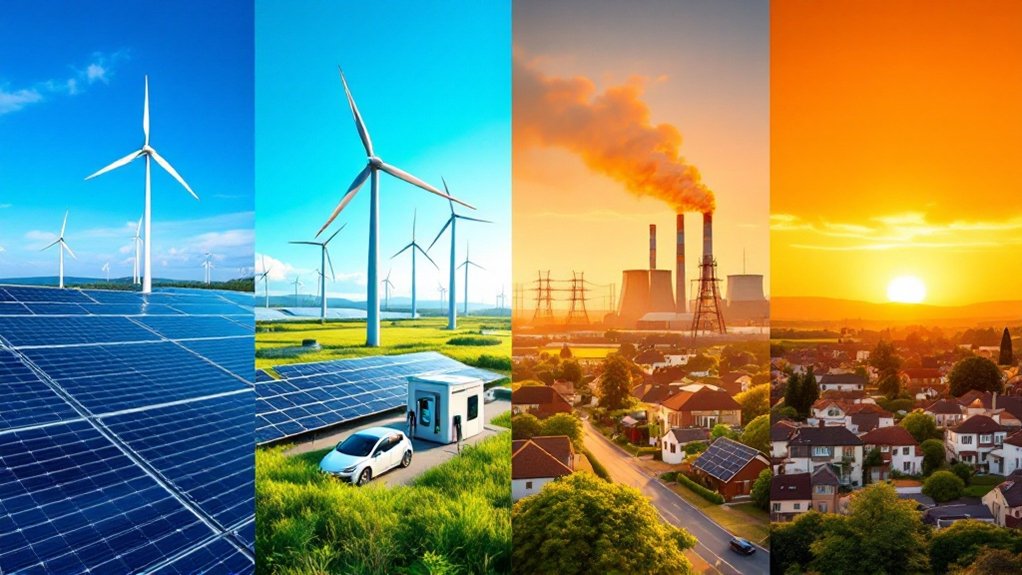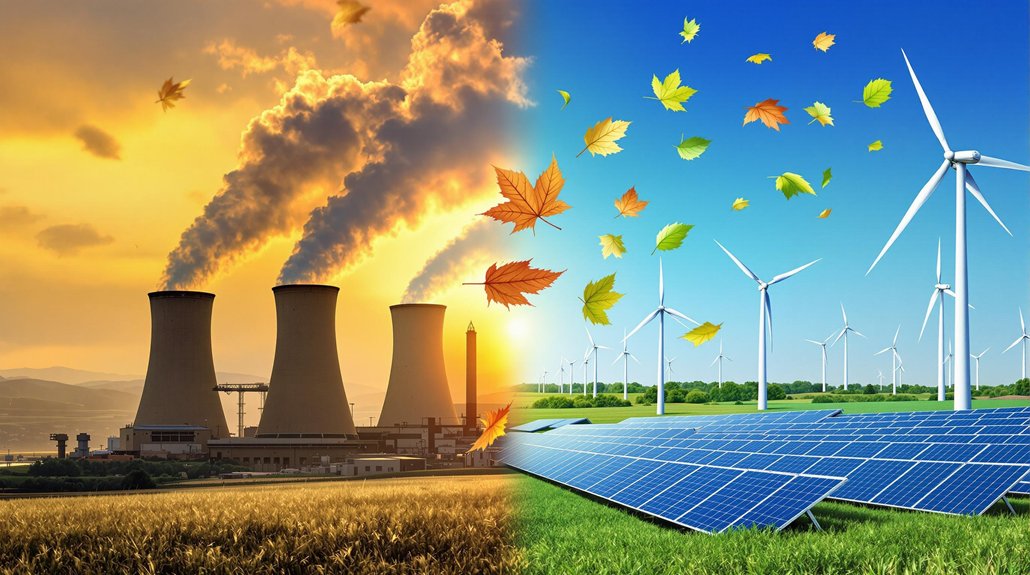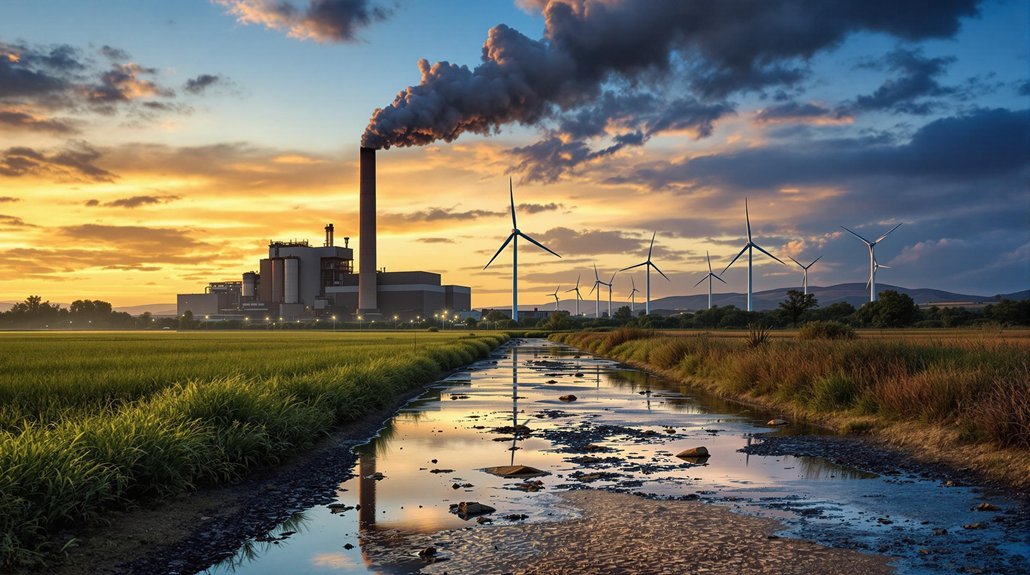Generations view sustainable energy through distinctly different lenses. Gen Z and Millennials strongly support renewable energy, with 56-57% favoring the phase-out of gas vehicles by 2035. In contrast, Gen X and Baby Boomers show resistance, with 53-59% opposing such shifts. Political beliefs create a 71-point gap in climate perspectives. Education levels, regardless of age, correlate with increased environmental concern. These generational divides shape our collective energy future.

While climate change concerns affect all age groups, research shows clear generational divides in attitudes toward sustainable energy. These differences appear most stark between the youngest and oldest living generations, with varying levels of support for renewable energy initiatives and policy changes.
Gen Z stands out as the generation most worried about climate impacts. A notable 56% support phasing out gasoline vehicles by 2035, and 75% would choose sustainable products over familiar brands. Their climate activism often influences older generations’ views on sustainability issues. Nearly a third of Gen Z adults have taken specific climate action through donating or volunteering.
Generation Z leads on climate concern, embracing sustainable brands and pushing older generations toward greater environmental awareness.
Millennials share many concerns with Gen Z, with 57% supporting the shift away from gas-powered vehicles. They report high climate anxiety, rating it 8 out of 10. About 42% favor ending all fossil fuel use, and they’re willing to pay extra for products that don’t harm the environment. Unlike older generations, Millennials readily embrace renewable resources that replenish naturally rather than needing replacement.
Gen X shows more skepticism, with 53% opposing the 2035 phase-out of gas vehicles. Only 32% support ending all fossil fuel use. However, this generation has increased sustainable spending by 24% since 2019, suggesting growing awareness of environmental issues. The Pew Research study found that 71% of Americans across generations prioritize alternative energy development over expanding fossil fuels.
Baby Boomers show stronger resistance to energy shifts, with 59% against phasing out gas vehicles. Just 25% support ending fossil fuel use entirely. Having learned about climate change in their 30s, they’re less likely to prioritize renewable energy development or change their energy habits.
The Silent Generation, who became aware of environmental issues in their 50s, focuses more on pollution than climate change. They prefer slow shifts to new energy sources and report lower climate anxiety than younger generations.
Political views heavily influence these generational patterns. There’s a 71-point gap between liberals and conservatives on climate views and a 53-point difference on renewable energy priorities.
However, support for sustainable energy is growing across all age groups, with younger people showing more emotional connection to climate issues. Education levels also correlate with increased climate concern regardless of age.
Frequently Asked Questions
How Do Regional Differences Affect Generational Views on Sustainable Energy?
Regional differences greatly impact generational views on sustainable energy.
Young adults in coastal regions often support solar and wind energy more strongly than their Midwest counterparts.
Older generations in fossil fuel-producing states typically show less enthusiasm for renewables.
Local energy costs, job opportunities, and visible infrastructure like wind farms shape opinions.
Educational opportunities and political environments in different regions also influence how age groups perceive the shift to clean energy.
Does Income Level Impact Generational Attitudes Toward Green Technology?
Income level considerably impacts how different generations approach green technology.
Wealthy Millennials often buy sustainable luxury items, while lower-income Gen Z embraces secondhand markets.
Affluent Boomers invest in large renewable projects, and middle-income Gen X leads in smart home energy systems.
Higher-income individuals across all age groups can more easily afford electric vehicles and solar panels, while lower-income households face cost barriers despite interest in sustainability.
Which Generation Is Most Likely to Invest in Home Renewable Systems?
Millennials are most likely to invest in home renewable systems. Despite delayed home ownership, they show the strongest commitment to sustainable energy.
Studies show 75% of Millennials will change buying habits for eco-friendly products, and they contributed $51.1 billion to sustainable funds in 2020.
While Gen Z shows strong interest, financial barriers limit their investments.
Gen X and Boomers, despite higher incomes and home ownership rates, prioritize sustainability less.
How Do Educational Backgrounds Influence Sustainable Energy Perspectives Across Generations?
Educational backgrounds strongly shape how different generations view sustainable energy.
Older adults with traditional education often show more skepticism toward renewables. Meanwhile, younger people who’ve learned about climate change in school tend to support green energy more.
College graduates across all age groups typically understand energy issues better.
The knowledge gap is closing as more adults take courses and find information online about sustainable energy options.
What Role Does Political Affiliation Play in Generational Energy Preferences?
Political affiliation strongly shapes generational energy preferences. The gap between parties has widened considerably since 2020.
Young Republicans support renewable energy much more than older Republicans, with 67% of those 18-29 prioritizing wind/solar compared to just 24% of those 65+.
Democrats show less generational variation, with strong climate action support across age groups.
This partisan divide creates uncertainty in long-term energy policy direction.









